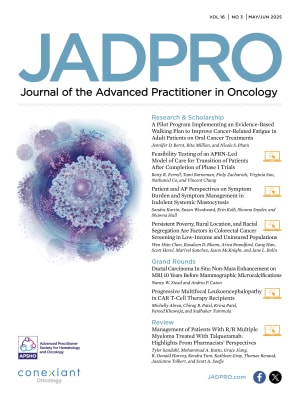Abstract
Abstract
Inhibitors of the epidermal growth factor receptor (EGFR) are important treatment options for non–small cell lung cancer (NSCLC) patients with activating EGFR mutations. Erlotinib, gefitinib, afatinib, and osimertinib are approved for use in NSCLC patients, and several other agents are in clinical development. The objectives of this article are to review the pharmacokinetic and known drug interaction data for EGFR tyrosine kinase inhibitors (TKIs) available for use in NSCLC patients, as well as adverse events (AEs) commonly observed with EGFR-TKI treatment, and to discuss relevant management strategies. The importance of this information for patient care is explored from the perspective of advanced practitioners. Pharmacokinetic, drug-interaction, and safety data are included for EGFR inhibitors approved for NSCLC (erlotinib, gefitinib, afatinib, and osimertinib). Relevant dose modifications and AE management strategies are also reviewed. The interdisciplinary health-care team plays an essential role in patient education, care planning, and medication administration. As such, it is essential that advanced practitioners understand the safety profiles and the potential for drug interactions with EGFR TKIs to ensure patients achieve the maximum benefit from these agents.







